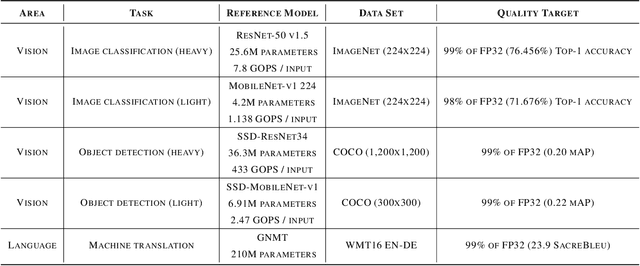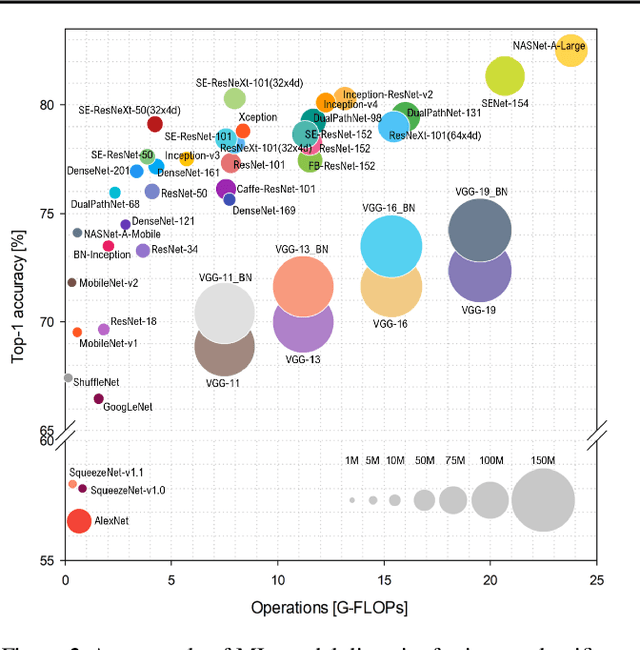William Chou
MLPerf Mobile Inference Benchmark: Why Mobile AI Benchmarking Is Hard and What to Do About It
Dec 03, 2020



Abstract:MLPerf Mobile is the first industry-standard open-source mobile benchmark developed by industry members and academic researchers to allow performance/accuracy evaluation of mobile devices with different AI chips and software stacks. The benchmark draws from the expertise of leading mobile-SoC vendors, ML-framework providers, and model producers. In this paper, we motivate the drive to demystify mobile-AI performance and present MLPerf Mobile's design considerations, architecture, and implementation. The benchmark comprises a suite of models that operate under standard models, data sets, quality metrics, and run rules. For the first iteration, we developed an app to provide an "out-of-the-box" inference-performance benchmark for computer vision and natural-language processing on mobile devices. MLPerf Mobile can serve as a framework for integrating future models, for customizing quality-target thresholds to evaluate system performance, for comparing software frameworks, and for assessing heterogeneous-hardware capabilities for machine learning, all fairly and faithfully with fully reproducible results.
MLPerf Inference Benchmark
Nov 06, 2019



Abstract:Machine-learning (ML) hardware and software system demand is burgeoning. Driven by ML applications, the number of different ML inference systems has exploded. Over 100 organizations are building ML inference chips, and the systems that incorporate existing models span at least three orders of magnitude in power consumption and four orders of magnitude in performance; they range from embedded devices to data-center solutions. Fueling the hardware are a dozen or more software frameworks and libraries. The myriad combinations of ML hardware and ML software make assessing ML-system performance in an architecture-neutral, representative, and reproducible manner challenging. There is a clear need for industry-wide standard ML benchmarking and evaluation criteria. MLPerf Inference answers that call. Driven by more than 30 organizations as well as more than 200 ML engineers and practitioners, MLPerf implements a set of rules and practices to ensure comparability across systems with wildly differing architectures. In this paper, we present the method and design principles of the initial MLPerf Inference release. The first call for submissions garnered more than 600 inference-performance measurements from 14 organizations, representing over 30 systems that show a range of capabilities.
AI Benchmark: Running Deep Neural Networks on Android Smartphones
Oct 15, 2018



Abstract:Over the last years, the computational power of mobile devices such as smartphones and tablets has grown dramatically, reaching the level of desktop computers available not long ago. While standard smartphone apps are no longer a problem for them, there is still a group of tasks that can easily challenge even high-end devices, namely running artificial intelligence algorithms. In this paper, we present a study of the current state of deep learning in the Android ecosystem and describe available frameworks, programming models and the limitations of running AI on smartphones. We give an overview of the hardware acceleration resources available on four main mobile chipset platforms: Qualcomm, HiSilicon, MediaTek and Samsung. Additionally, we present the real-world performance results of different mobile SoCs collected with AI Benchmark that are covering all main existing hardware configurations.
 Add to Chrome
Add to Chrome Add to Firefox
Add to Firefox Add to Edge
Add to Edge